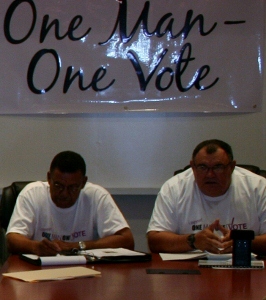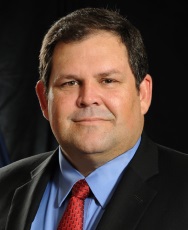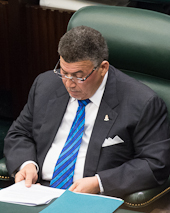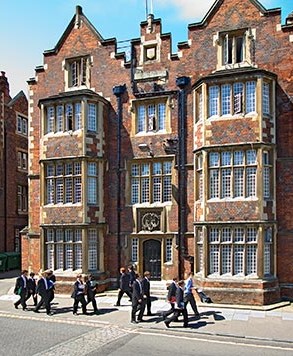 Politics
Politics

EY points to major sell-off
 (CNS): The premier has released the report by Ernst and Young into the rationalization of government and the potential sale of public services. Announcing the arrival of the completed 260-plus page report, Alden McLaughlin said that government had received it Monday afternoon and had made no decisions on the recommendations contained in it. The report makes far reaching radical recommendations for a sell off of government and if implemented would place significant public services into the hands of the private sector, from education and healthcare to the airport and port. The document recommends the sale and outsourcing of dozens of government assets and services.
(CNS): The premier has released the report by Ernst and Young into the rationalization of government and the potential sale of public services. Announcing the arrival of the completed 260-plus page report, Alden McLaughlin said that government had received it Monday afternoon and had made no decisions on the recommendations contained in it. The report makes far reaching radical recommendations for a sell off of government and if implemented would place significant public services into the hands of the private sector, from education and healthcare to the airport and port. The document recommends the sale and outsourcing of dozens of government assets and services.
Promising that the government would be examining the entire thing very carefully, McLaughlin refused to commit to a single recommendation as he said the decisions would be made by the entire caucus. He said the report was being released to the public in the interests of transparency but the process of deciding what could be achieved would now begin as the PPM government will be examining the findings and looking at what it can support.
Although McLaughlin made no mention of a public consultation process, there is no doubt that the report's recommendations will stir up major public opinion on both sides. While some people will support the myriad sell-off suggestion, others may find the recommendations unpalatable and too great a departure from the accepted roles and responsibilities that government, as the collective representative of the people, should deliver.
The recent public debate that has emerged regarding the privatization of education, which has not won the hearts and minds of the broader public, is a clear indication that if government intends to implement the early priority recommendations in the report it is unlikely to get wide public backing for some of the more radical proposals.
The report is extensive and complex but it suggests the sale of public owned land, the Turtle Farm, Radio Cayman, the stock exchange and the Water Authority, the outsourcing of the entire hospital services and local clinics, privatizing CINICO and an increase in the fees the insured pay, increasing the fares on Cayman Airways to reflect the true costs, moving and selling off the airport, merging of some of CIMA’s services with the General Registry, abolishing the development bank, GIS, the Housing Development Trust and the National Drug Council. Recommendations include the introduction of charter schools with private sector entities running them as well as merging the primary schools on Cayman Brac.
The report also points to centralization of certain government elements, such as finances, HR, procurement, IT, revenue collection. It points to merging the National Gallery, the museum and the CNCF. The report also talks about merging support staff for the auditor general, the information and complaints commissioners, cutting security jobs and clarifying who does what at District Administration in Cayman Brac, with a view to cutting some of the jobs and centralising the services.
McLaughlin told the press Tuesday that he would not sell off government assets to get cold hard cash in the short term if his government felt it was not in the long term interests of the country but he refused to say where he believed the PPM government might start with the recommendations in the report.
The premier made a commitment, however, to keep the public updated throughout the process and wold announce as soon as any decision would be made about the implementation of any of the reports recommendations.
The deputy governor also assured civil servants that no one would be shown the door tomorrow and everyone in the service would be treated fairly during the transition.
See the full document below.

Audit follows up on NBF
 (CNS): With millions of dollars of public money given out to churches, charities, students and other non-governmental organisations under the controversial Nation Building Fund without any proper oversight, the Office of the Auditor General (OAG) has confirmed it is still following up on what happened to the cash. The office first confirmed it would look at the Fund some three years ago. The NBF was created by the former premier, Mckeeva Bush, and although he insisted there was a committee managing the substantial amounts doled out to applicants, following his exit from office questions were raised about the existence of any genuine oversight, how the public money had been given out and what it had been used for.
(CNS): With millions of dollars of public money given out to churches, charities, students and other non-governmental organisations under the controversial Nation Building Fund without any proper oversight, the Office of the Auditor General (OAG) has confirmed it is still following up on what happened to the cash. The office first confirmed it would look at the Fund some three years ago. The NBF was created by the former premier, Mckeeva Bush, and although he insisted there was a committee managing the substantial amounts doled out to applicants, following his exit from office questions were raised about the existence of any genuine oversight, how the public money had been given out and what it had been used for.
The auditor general usually focuses on examining the government’s own books but on this occasion the office had to approach the governor for authorization to contact the people and organisations who received the grants. The public management and finance law allows the public audit office to include non-government entities in its audits if it is in the public interest.
Given the public outcry and the concerns raised about the way the NBF grants were handed out, the audit office stated last year that it would be undertaking a value for money audit examining the entire fund.
“The Office of the Auditor General is continuing its performance audit of all payments made from the Nation Building Fund and how they were administered by government. The audit includes obtaining information from a sample of recipients about how they used the funds,” a spokesperson from the office told CNS this week as he confirmed that it was not just the churches that were being called to account for the money.
The audit office which faces a packed agenda had originally signalled its intention to start the audit on the Nation Building Fund in 2011
A significant amount of cash was given to churches in what are now the well documented issues surrounding what was described by some as a “political slush fund”.
As a result of the public outcry and controversy that followed when the details of how much had been doled out from public funds was revealed several churches opted to give the money back. The grants had been made at a time when government was forced to make cuts in many areas including civil servants pay.
Bush defended the fund on several occasions and especially his decision to direct that money be given to local religious organisations. The former premier had taken the position that helping the churches and helped young people via various NGOs would build better communities and keep young people out of trouble and out of jail. The former leader took the view that donating government funds to youth development programmes in churches or other charitable organisations was cheaper than paying for young people in prison.
The controversies arose however when it became apparent that there was no clear criteria or policy position governing the allocation of the public money. The implication by Bush’s former Cabinet colleagues, in the post UDP minority administration, was that the decisions over who got what cash were made directly by the former premier.
At least $10million was believed to have been given out from the fund following its creation in the 2009 budget.
Related stories:
http://centos6-httpd22-php56-mysql55.installer.magneticone.com/o_belozerov/31115drupal622/politics/2011/08/11/ag-probe-nation-building
http://centos6-httpd22-php56-mysql55.installer.magneticone.com/o_belozerov/31115drupal622/politics/2011/08/05/churches-get-4m-public-cash
http://centos6-httpd22-php56-mysql55.installer.magneticone.com/o_belozerov/31115drupal622/politics/2013/02/24/fund-politicizes-church
http://centos6-httpd22-php56-mysql55.installer.magneticone.com/o_belozerov/31115drupal622/politics/2013/11/22/nbf-grants-3x-scholarships
http://centos6-httpd22-php56-mysql55.installer.magneticone.com/o_belozerov/31115drupal622/politics/2013/07/11/wb-church-gives-money-back
http://centos6-httpd22-php56-mysql55.installer.magneticone.com/o_belozerov/31115drupal622/politics/2013/04/18/2nd-church-giving-cash-back

Late fee C/C bill unknown
 (CNS): Government might have wasted tens of thousands of dollars on credit card late fees as an ongoing FOI request by CNS has revealed that late fees appear to be common on cards issued to public servants and ministers. But with no central control over the management of government credit cards, the late fees bill to the public purse over the last decade could easily exceed $100,000. Based on the details released so far in what has been a very mixed response to a blanket FOI request by CNS for the statements, government entities seem to have accepted late fees as the norm and there has been no one monitoring the growing bill.
(CNS): Government might have wasted tens of thousands of dollars on credit card late fees as an ongoing FOI request by CNS has revealed that late fees appear to be common on cards issued to public servants and ministers. But with no central control over the management of government credit cards, the late fees bill to the public purse over the last decade could easily exceed $100,000. Based on the details released so far in what has been a very mixed response to a blanket FOI request by CNS for the statements, government entities seem to have accepted late fees as the norm and there has been no one monitoring the growing bill.
CNS has asked for the credit card statements of every government issued credit card from 2007 to date but so far only a handful of entities have responded in full. However, from the Information Commissioner’s Office (the first agency to make a complete and full disclosure) to the planning ministry, most of the entities that have released statements record late fees and large interest payments.
Government officials have been unable to state who is ultimately responsible for the accumulation of a potentially large late payment bill to the government coffers as each entity is responsible for their own bills. The issue has been acknowledged by government officials, however, since the first revelations regarding the misuse of credit cards across government was revealed in a selection of statements leaked to the press.
According to information from the deputy governor’s office, it is the Treasury which is responsible for obtaining credit cards from government’s bankersand ensuring that all card holders are provided with the government’s credit card policy, but late payments are down to each individual chief officer or department boss.
Officials told CNS that late fees occur for a variety of reasons, including the late submission of expense claims, original receipts and other supporting documentation. Government also said that the banks issued credit card statements only one or two days before the payment due date and in some instances after the payment due dates, making it “extremely difficult if not impossible to meet the payment due date.”
Measure have been taken, officials told CNS, to avoid future late fees as ministries, portfolios and offices are now more vigilant about making timely payments on credit cards.
Officials said a combination of accessing credit card statements online, among other new directions, allows for better management, monitoring and settlement of credit card transactions. Monthly credit card statements from government’s bankers are now being received well before the due dates. A pre-set payment due date has also been established by the government’s bankers for all cardholders, and financial officers are now querying late fees and interest charges if the delay is caused by the government’s bankers.
As a result, officials said that the public sector should be able to adhere to the credit card policy, which requires payments to be paid on or before the due date.
Despite its purchasing powe,r government is still being charged 18% per annum on unpaid credit card balances.
“The Treasury Department approached the government’s bankers in January 2014 querying the high interest rate charged and was advised that the rate was reflective of industry standards,” officials confirmed.

MLAs seek to ensure OMOV
 (CNS): Cautiously welcoming the premier’s announcement on the implementation of 'one man, one vote' in single member constituencies, the two independent members are calling for some changes to the proposed motion to make certain that the long-awaited electoral reform happens in time for the 2017 general election. Arden McLean, the member for East End, said he would withdraw his private member’s motion on the issue if the government changed its motion to include a deadline and confirm the number of constituencies at 18, removing the potential for either an increase to 19 or a reduction to 17 constituencies with the Sister Islands as a multi-member district.
(CNS): Cautiously welcoming the premier’s announcement on the implementation of 'one man, one vote' in single member constituencies, the two independent members are calling for some changes to the proposed motion to make certain that the long-awaited electoral reform happens in time for the 2017 general election. Arden McLean, the member for East End, said he would withdraw his private member’s motion on the issue if the government changed its motion to include a deadline and confirm the number of constituencies at 18, removing the potential for either an increase to 19 or a reduction to 17 constituencies with the Sister Islands as a multi-member district.
Although the premier committed during a press briefing on Wednesday to having the entire process completed before June of next year and that Cayman Brac and Little Cayman will have two seats in the LA, McLean told the press Thursday that when it comes to politics he doesn’t trust his former party colleague, Alden McLaughlin, and wanted to see these commitments in black and white in the government motion.
His sentiments were echoed by Ezzard Miller, the representative for North Side, who had backed McLean’s OMOV motion and who has also advocated heavily for the voting change.
“We’ve heard these promises before,” Miller pointed out.
McLean said that he and the government were now very close and it was clear that they could work together on the issue, but given the past history, it was important that it was clear and that there was no room for doubt on what the plan was and that it would happen in time for the next general election. Confident that both his and Miller’s constituencies would be protected, even though they and the Sister Islands two constituencies would be smaller than the other fourteen, McLean pointed to the constitution that directs the Boundary Commission to consider the historical district boundaries of constituencies.
Congratulating McLaughlin on his decision, he added, “We are ready to work with the government now. I am not hear to embarrass the government but the motion is not definitive enough and we are concerned about the timeline being fixed and the potential for an increase in seats.”
McLean said that by leaving the number of constituencies open to interpretation there was a danger that the seats could increase. That would not only increase costs in government at a time when it can ill afford it but also, if government intended that to be an extra minister, it would further undermine the power-balance in parliament between the Cabinet and the legislative members.
Pleased that the premier had acknowledged their agitation and the public desire for the change, whatever the reason for the premier’s change of heart, the independent members said they could get fully behind the government on the issue now, provided the “wiggle room” was removed and the “belt and braces” added. The men said that these small amendments to the motion would guarantee that Cayman would finally move to an equitable and modern voting system.

UK watchdog backtracks on blacklist
 (CNS Business): In a complete about-face following its initial blacklisting of the Cayman Islands and subsequent refusal to remove the jurisdiction from its list a ‘High Risk Countries’, the Financial Conduct Authority, which regulates the UK’s financial services industry, has confirmed that the list has been removed from its website and that it does not plan to publish such a list in the future. It also has committed to a full review of the methodology that resulted in the Cayman Islands being placed on the list. Premier Alden McLaughlin will be leading a small delegation, including Minister Panton, to the UK shortly to further discuss the circumstances around this issue with the FCO and other UK government departments. Read more on CNS Business
(CNS Business): In a complete about-face following its initial blacklisting of the Cayman Islands and subsequent refusal to remove the jurisdiction from its list a ‘High Risk Countries’, the Financial Conduct Authority, which regulates the UK’s financial services industry, has confirmed that the list has been removed from its website and that it does not plan to publish such a list in the future. It also has committed to a full review of the methodology that resulted in the Cayman Islands being placed on the list. Premier Alden McLaughlin will be leading a small delegation, including Minister Panton, to the UK shortly to further discuss the circumstances around this issue with the FCO and other UK government departments. Read more on CNS Business
Alden commits to OMOV
(CNS): The premier has made a commitment to the country’s voters that they will all have just one vote in single member constituencies when they go to the polls in May 2017. In an official announcement Wednesday, reversing his early U-turn on the PPM’s electoral promise, Alden McLaughlin said that the decision had the full backing of the Progressives and other government members, despite earlier comments about his concerns that he couldn’t carry all of them with him on the issue. He will now bring a motion to the Legislative Assembly next week to set the wheels in motion for the electoral reform, which will begin with a new boundary commission.
Although two previous reports and recommendations from boundary commissions failed to result in any change to the country’s multi-member constituencies and inequitable voting, McLaughlin said that this time the report would lead to an amendment in the law before the next election.
The premier pointed out that the significant increase in the electorate numbers since the 2010 Boundary Commission, a growth of more than 20 percent in registered voters, meant that another commission had to be established to ensure the most equitable boundaries for the new constituencies while at the same time giving due consideration to the historical districts.
McLaughlin pointed out the exceptions and that while equity of voter numbers would suggest that North Side and East End should be one constituency, and the same for Cayman Brac and Little Cayman, constitutionally the Sister Islands had the right to two representatives and the historic boundaries of the districts of East End and North Side would not be overturned.
He did make it clear, however, that there will be no exception for Cayman Brac and Little Cayman with one man, one vote in single member constituencies so the Boundary Commission will confirm the boundaries of what will become two constituencies across the Sister Islands.
The commission will be tasked to decide all of the boundaries for what are likely to still be 18 constituencies. However, McLaughlin aired his continued concerns about even numbers and said it may be that the new boundary commission will consider whether or not there should be an odd number.
McLaughlin denied that his recent reticence over the implementation of OMOV was an “about face” but said the debate in government and his own party was not a rejection of equitable voting but about the best way to achieve it.
But in the end no voting system is perfect and the idea of ‘at large candidates’, which he said was working well in other small jurisdictions, may still suit Cayman but it would require a change to the constitution and take much longer to implement. Moving to a simple OMOV system in SMCs, he said, could be achieved in much less time.
Based on the timeline of the work of previous Boundary Commissions, McLaughlin was confident that a new report defining the new boundaries and the necessary changes to the elections law would all be made within a year, leaving plenty of time for a public education campaign well before the next election.
He said that there was no doubt that that agitation by the independent opposition members had pushed government to deal with the issue now and his said in the end it was the right thing to do as it should not be a distraction and he was happy to deal with it. Recognising that it might not be high on the list of public concerns, he said it was still important and something he had been trying to get done since 2002 when the PPM was first formed.
“For me those of us that have been around for a while, it will be quite a watershed,” the premier said.
Watch video of press briefing on CNS Business
See the premier’s presentation below and the motion which is being brought to parliament next week.

Mac asked to leave PAC
 (CNS): The chair of the Public Accounts Committee has written to his deputy chair, McKeeva Bush, asking him to resign from the committee as a result of his recent attacks on the auditor general. Roy McTaggart said he believes Bush is conflicted and not in a position to deal objectively with a number of the reports the PAC needs to examine. The opposition leader has not yet responded to the PAC chair in writing but failed to appear at Wednesday’s open hearing at the LA, when the PAC met to examine witnesses in connection with a series of reports by the auditor general on the systemic problems of governance. However, Bush told CNS that he is not the one who is conflicted.
(CNS): The chair of the Public Accounts Committee has written to his deputy chair, McKeeva Bush, asking him to resign from the committee as a result of his recent attacks on the auditor general. Roy McTaggart said he believes Bush is conflicted and not in a position to deal objectively with a number of the reports the PAC needs to examine. The opposition leader has not yet responded to the PAC chair in writing but failed to appear at Wednesday’s open hearing at the LA, when the PAC met to examine witnesses in connection with a series of reports by the auditor general on the systemic problems of governance. However, Bush told CNS that he is not the one who is conflicted.
The former premier said he had criticised the auditor because, among other things, he was party to making the Cayman Islands Government pay $55 million more than it will need to over the next 15 years because he had stopped a deal the former premier wanted to pursue to repackage government loans.
“The auditor wrote reports on people and published them without first talking to the person and hearing their version of what he or his colleagues had wanted to write, particularly when he is so wrong and would see how wrong he is if he talked to the person he is criticising who has the information to prove to him the situation,” Bush said. The opposition leader also accused the auditor of bringing bills for PAC to approve his audit work without the documentation to substantiate that work.
“I took him on when I became a member of the PAC,” Bush told CNS via email on Wednesday afternoon. “The more he criticised us, wrongly, I spoke about it publicly. But somebody had to stand up to him and others who are controlled by the governor, when they criticise civil servants, politicians and members of the public.”
Bush stated that he was not conflicted and not the one who should resign, as he pointed to the Commonwealth Parliamentary Association’s position on public accounts committees.
“Roy McTaggart is the one that should resign for conflicts. According to the last CPA meeting in Barbados, the benchmark set by them for Commonwealth parliaments is that the PAC should be chaired by the opposition, not by one who is part of the government. He is in conflict, not me,” Bush insisted.
If Bush refuses to resign, it is not possible for the chair to remove him or any other member of the PAC as it is a committee elected by the entire Legislative Assembly. In order to press the issue McTaggart will require the support of his parliamentary colleagues and it will be down to the members of the LA to support a no confidence motion against Bush’s position on the committee to now remove him from the seat.
Given Bush’s previous outbursts regarding Auditor General Alastair Swarbrick, it came as a surprise when the PPM nominated the opposition leader last May during the new government’s first legislative sitting to serve on the committee that would be examining a number of reports that were critical of Bush’s former administration.
Speaking to CNS during a break from the committee meeting Wednesday, McTaggart expressed his concerns about the latest public comments that the deputy chair had made about the auditor general and the relationship that the PAC has with Swarbrick’s office. The PAC chair said it was not appropriate for Bush to continue to serve on the committee.
“My concerns is over his response to the report about travel and hospitality. He has been quite vocal and critical of the auditor general,” he said, adding that this was wrong as the PAC members are required to be objective. “The auditor general reports to PAC and he is an instrument of good governance. I felt that Mr Bush’s criticisms of the auditor general and his reports demonstrated a lack of objectivity and a clear conflict of interest for him in this role on the committee.”
McTaggart said he felt Bush had taken things “personally” when he responded to the report, which had highlighted a number of serious shortcomings in the way government managed the expenditure by senior civil servants and ministers on entertainment, hospitality, and travel. But that this was not the only report from the auditor’s office that Bush had criticized and that the public were well aware of the direct criticisms the opposition leader has made frequently about Swarbrick.
Bush has made a considerable amount of public comment about the auditor general and referred to him as “the hit-man” of the former governor Duncan Taylor. The opposition leader has also implied that Swarbrick undermined his efforts, not just over the repackaged loan proposals but many of his proposed capital projects. Nor is Swarbrick the first auditor to come in for direct attack from Bush. His predecessor, Dan Duguay, was also a target and labelled “a cowboy” by Bush as a result of a number of his reports which were critical of projects during the 2001 to 2005 Bush led UDP administration.
The PAC met Wednesday morning to begin examining witnesses in relation to five reports from the Office of the Auditor General covering fundamental problems in the governance of the country, in the absence of any of the committee’s opposition members. The reports, which painted a dire picture of basic failures throughout government, were released to the public in January. (See details here)
Captain Eugene Ebanks sent his apologies, as the West Bay member was not on island, while Bush sent a message stating that he would be late if he was able to attend at all, which in the end he did not. As a result, the chair pressed on with the meeting with just the two government members of the committee, Winston Connolly and Joey Hew, who together made the necessary quorum of three.
New election commission
(CNS): The premier has announced his government’s intention to request a new Boundary Commission to assess the current political landscape ahead of the next election, with the view of introducing 'one man, one vote' in single member constituencies. In what is likely to be a welcome U-turn, Alden McLaughlin has promised that the necessary work and legislative changes will all be done within the year and be in place before May 2017. He said it would be down to the Boundary Commission on the exact details of the new constituencies based on both historical boundaries as well as equal numbers, and there will be no at large candidates.
Check back to CNS for full details later.

MLA: Stop top jobs for life
(CNS): The independent member for North Side has called on the government to change the constitution and put an end to top public sector life-long appointments provided for under the 2009 Cayman Consitution. Ezzard Miller said that those holding top jobs within specialist public sector bodies, such as the complaints commissioner, the auditor general and the director of public prosecutions, should not have those jobs for life and should serve for three years only, with a possibility of renewal for two more years if they do a good job. However, five years should be the maximum amount of time that anyone should serve, he said, because at present there is no way to remove people who fail to live up to their high office.
Miller is asking for a select committee of parliament to examine the constitutionally established and protected posts and review the terms of office to ensure no one can hold any post such as the attorney general’s job for life. While some are five year terms he said the people holding the posts are still able to re-apply for another five years and he said that he believes it is too long for the same person to hold these important independent positions because no one is able to hold them to account.
The MLA said that this may require a referendum as the constitution calls for all but minor changes to it be put to the people but either way it was time to make the change and put an end to people holding high office eternally without anyway of removing them.
He pointed out that for those holding senior life-time contracts, there is no evaluation process and no one is assessing whether or not they are doing a good job. “There is no mechanism for review or evaluation in a number of senior and very important positions and that needs to be addressed,” Miller said.
Hoping to get the backing of parliament, Miller is bringing a private members motion to the Legislative Assembly when it meets next week to begin the process of examining the constitution and establishing whether the changes can be made by the Legislative Assembly or whether it needs to be put to the people. He said that if a referendum was required, it would be cheaper to do it at the same time as the 2017 election . But he said the sooner a committee was established to address the issues the better.

Report reveals entrenched elites running Britain
 (CNS): A new study in the UK has found that elitism is so embedded in British society that it has created a closed shop for the country’s top jobs which are held by privately educated and Oxbridge graduates. The Social Mobility and Child Poverty Commission examined the social background of those "running Britain" and described the situation as 'social engineering', as it was keeping out talented people from diverse backgrounds. Only 7% of the UK population attended private school. But 71% of senior judges, 62% of senior officers in the armed forces, 55% of top civil servants, 53% of senior diplomats, 50% of members of the House of Lords and 45% of public body chairs did so.
(CNS): A new study in the UK has found that elitism is so embedded in British society that it has created a closed shop for the country’s top jobs which are held by privately educated and Oxbridge graduates. The Social Mobility and Child Poverty Commission examined the social background of those "running Britain" and described the situation as 'social engineering', as it was keeping out talented people from diverse backgrounds. Only 7% of the UK population attended private school. But 71% of senior judges, 62% of senior officers in the armed forces, 55% of top civil servants, 53% of senior diplomats, 50% of members of the House of Lords and 45% of public body chairs did so.
The details of the report are published in Thursday’s edition of The Guardian and Alan Milburn, the Labour former cabinet minister who chairs the commission, said that, as well as being unfair, this situation was unacceptable because "locking out a diversity of talents and experiences makes Britain's leading institutions less informed, less representative and, ultimately, less credible than they should be".
Looking at the background of more than 4,000 people filling jobs at the top of government, the civil service, the judiciary, the media, business and the creative industries, the commission investigated where they went to school, on the grounds that going to a private school is reasonably indicative of a wealthy background.
The study found that Oxbridge graduates have a stranglehold on top jobs. They comprise less than 1% of the public as a whole, but 75% of senior judges, 59% of cabinet ministers, 57% of permanent secretaries, 50% of diplomats, 47% of newspaper columnists, 44% of public body chairs, 38% of members of the House of Lords, 33% of BBC executives, 33% of shadow cabinet ministers, 24% of MPs and 12% of those on the Sunday Times Rich List.
The report says the judiciary is the most privileged professional group. About 14% of judges attended one of just five independent schools (Eton, Westminster, Radley, Charterhouse and St Paul's Boys).
"Where institutions rely on too narrow a range of people from too narrow a range of backgrounds with too narrow a range of experiences, they risk behaving in ways and focusing on issues that are of salience only to a minority but not the majority in society," Milburn stated.
Tristram Hunt, the shadow education secretary, said the report showed the coalition was failing on social mobility. "Under the Tories, the attainment gap between disadvantaged children and the rest is increasing, millions of hardworking people are seeing their living standards go backwards and child poverty is set to increase," he said.